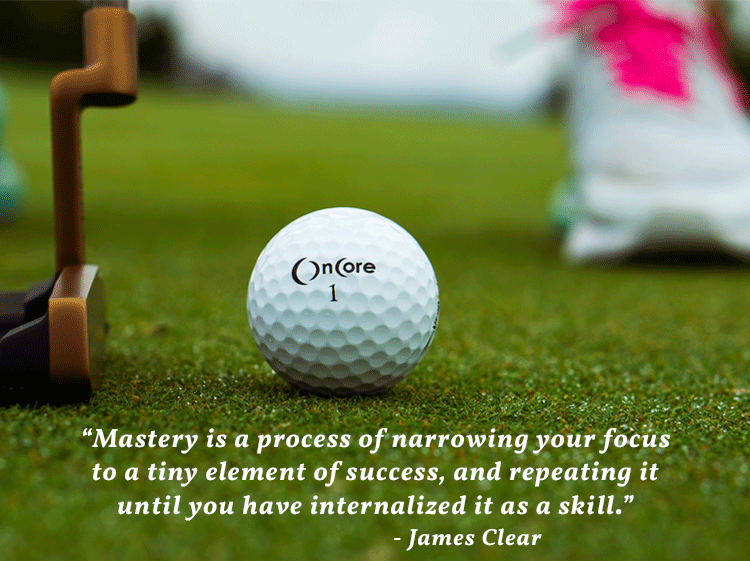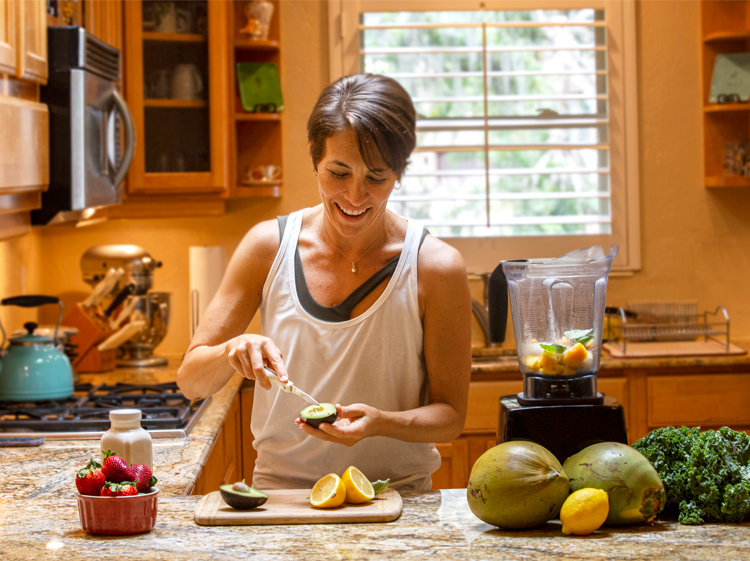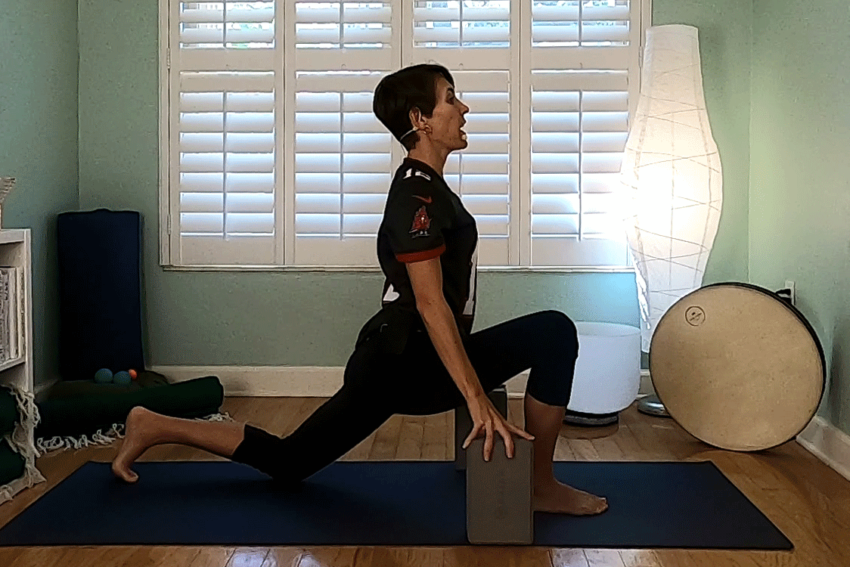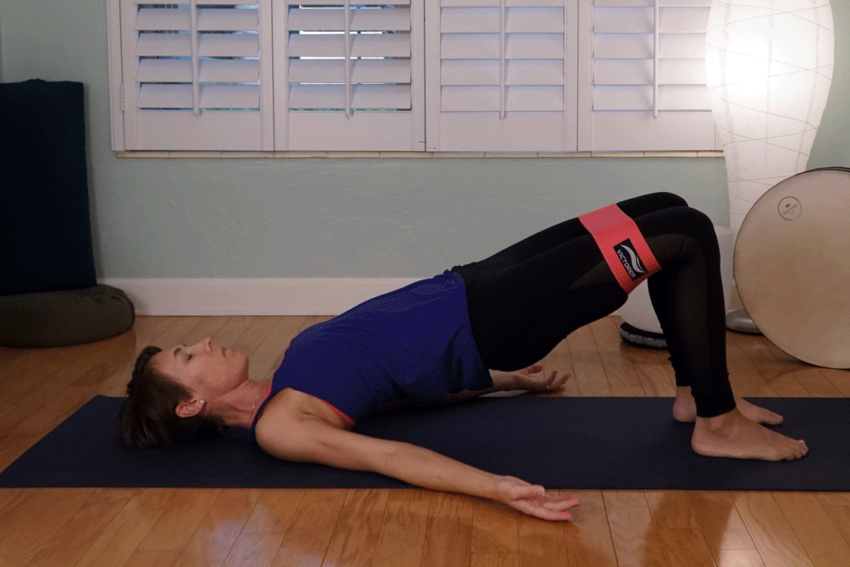Deliberate practice is the third ingredient to mastery as a golfer. It’s what removes the feeling of being stuck in your game and unlocks a heightened level of performance. This commitment to small, unrelenting improvement is also what builds the foundation from which to grow. And it provides the inspiration to sustain your success with more ease and joy along the way.
Just this week, my husband and I finalized the sale of the commercial building which housed our offices for the past 15 years. It was bittersweet to walk through the space we so beautifully designed. I could feel the positive energy of the thousands of people who walked through those doors—for yoga classes or private sessions—all leaving with a brighter smile and beaming heart.
The downside of this transition has simply been the stress of moving. Since I now live two hours away, I’ve logged many miles in the van to clear out the building. My weekly routine has also gone out of the window to ensure everything is done before heading back to my home in Florida.
Thankfully, the simple structure of sun salutations in my yoga practice has provided a framework in which to process this emotional whirlwind. I get to move the body through consistent and fluid movements. And although I have been through the motions countless times, I am invited in each step to move deliberately.
This is the same for life—and your golf game. When you heighten your awareness as you move through reliable steps, you free up mental and physical space in which new opportunities and experiences can enter. I suggest you utilize the 5 tips below to access this potential right now, both on and off of the golf course.

THE IMPORTANCE OF DELIBERATE PRACTICE
Like I just mentioned above, deliberate practice is the third ingredient to refining your craft as a golfer.
Ongoing learning is what keeps you on the cutting edge in your golf game. And since there isn’t a predetermined curriculum to keep learning, it’s imperative you make your own. Then, once you know what you want to learn—as well as how and when to learn it—you can select good habits to internalize those new ideas.
As you know, habits are just repeated actions. The more you get comfortable with any habit, the more easily you can move through the actions with speed, fluency, and skill. The flipside of this is that you can become less sensitive to feedback from your environment and fall into mindless repetition.
You see this often when you give verbal cues to your long-standing students and they go on autopilot. Instead of listening to your exact words, they jump into their familiar patterns.
Instead of defaulting to autopilot on your own path to mastery, deliberate practice can help you:
- prevent unwanted slips
- ward off decline in your performance (basically your ability to show up and complete your tasks with excellence), and
- avoid the trap of complacency.
Download the worksheet above. Then…
Just as you move with heightened awareness on your yoga mat to prevent injury, you can take action on purpose to gain mastery as a yoga professional.
(1) CREATE A SYSTEM THAT WORKS FOR YOU
A few weeks ago, you created an ongoing learning plan to fit your unique passions, learning style, and time constraints. Essentially, you established a system in which to keep learning.
The same type of structure is also needed for you to practice your new habits. A system will provide boundaries that can define how you spend your time and focus. Instead of feeling overwhelmed or confused about which decision to make next, you’ll have a plan in place. This will free up an immense amount of mental and physical energy that you can then pour into the deliberate practice itself.
And from this stability, you generate a strong foundation from which to grow. Here are some elements to consider when creating your system for deliberate practice:
Keep it simple
Your brain is hardwired to conserve energy, so create a system that required the least amount of work for you. This could mean changing your location to minimize distractions as you practice or delegating tasks to another staff member so that you have the time to do so.
Find consistent times to practice
This could be the same time of day or the same days of the week. Again, this takes the guesswork out of showing up to practice. Pair this with a regular location in which to practice and you’re far more likely to show up and get the work done.
Shift your environment to support success.
You have 10 million sensory receptors in your eyes alone. This means that what you see in your immediate environment affects your actions. So, either place something in your immediate surroundings to inspire your practice. Or, clear up your space so you can do so without distraction.
(2) SELECT THE RIGHT PLACE TO FOCUS
As an entrepreneur, you wear many hats. You’re often the CEO, manager, bookkeeper, teacher, social media specialist, and Human Resources director. Thus it can be tempting to want to refine your skills in all of these areas at once. Instead, select the right place to focus. This will make your journey toward mastery much easier and more rewarding.
“But what to focus on?” you might ask.
You have an infinite array of topics to choose from. Maybe you might want to refine your verbal cues as a teacher or perhaps you want to dive deep into yoga philosophy. You might be adding more teachers to your team and desire to refine your leadership skills.
In any case, you have a unique set of natural strengths. Use those as markers to select your focus. Also, ask yourself the following questions to clarify where you can best use your attention to practice deliberately:
Which habits best suit me?
Habits and actions that are enjoyable are far more likely to stick in the long run.
What feels like fun to me?
If you can handle the “pain” of practice on certain topics easier than others, this is a sign you’re on the right track. When excitement dwindles, your interest will keep you going.
In which activities do I lose track of time?
Losing track of time is one of four elements of the flow state. Said another way, you want to train yourself to be in the zone. You want your deliberate practice to blend personal happiness with peak performance. This will allow you to sustain greater and greater levels of success.

(3) STAY IN GAME SHAPE
Deliberate practice helps you stay in game shape. It gives you the mental and physical preparedness to embrace any fabulous opportunities as it arrives on your doorstep. This is the sthira–or steadiness–you cultivate in yoga to allow more sukha, or ease. Basically, the systems you put in place to practice will help you perform well at a moment’s notice. Your customized structure will give you a rhythm. And, it will help you persist at excelling over time.
But this deliberate practice extends beyond traditional learning resources, like reading books or listening to podcasts. Give your attention to these other important areas so that you can be your best when the time calls:
- Get enough sleep. This will allow your mind and body to assimilate the new changes you are putting into place.
- Fuel your body well. You want your brain to function optimally. This involves feeding your body well so that you have mental and physical energy to spare.
- Stimulate the mind with engaging conversations. The people around you can be a great resource in which to deliberately practice mastery.
- Ask others what inspires them. Listen authentically. And be willing to glean tidbits of wisdom from others to increase your own performance.

(4) BE READY TO SPRINT
Daily, measured progress keeps your momentum moving forward. Yet on occasion, you will be required to sprint. There will be moments when your work demands more of you—and you want to be ready to supply that energy when needed.
For example, here at The Flexible Golfer, I commit to sharing resources that will help you thrive as a golfer. This requires me to continually read new books and explore new concepts. I must then actually sit down to put these ideas into words you can then understand. And, I further refine these ideas for our monthly training in the Swagtail’s Virtual Yoga Studio. This is my steady progress.
Right now, though, I need to sprint. I have a deadline before our focus-based course, The 3H Project, gets released. This requires extra time to refine the audio elements of the course, and edit the modules as well. It feels like I spend more time with my computer than my family during this heightened time period.
If this pace was required at all times, I’d burn out before the end of the month. The point is, I use deliberate practice to move with the ebb and flow of my life. I utilize daily habits that sustain my regular progress and I keep an energetic reserve to ensure I can meet heightened demands as well. This is also true in your golf game.
Your ability to sprint requires a confident answer to these questions:
- Am I clear about what elements are most important in my golf game right now?
- Is my team coach about these objectives?
- Am I willing to say no to good things to embrace the greater ones?
- Am I mistaking being busy with deliberate practice?

(5) REFLECT ON YOUR PROGRESS
The very moment you feel like you have mastered a skill is the very same instant you’re likely to become complacent about it. This is why it’s essential to reflect on your progress. You want to review your habits and make adjustments continually.
In yoga, we call this svadyaya. It’s the time you take to study yourself—your beliefs, your words, your actions. This level of reflection allows you to sustain long term success because you become aware of your mistakes. You can realistically review your performance.
You’ll know if you are better or worse than you were in the past, and if the methods you are using for deliberate practice are actually working to help you reach your goals. Said another way, reflection helps you consider, and reconsider, your ongoing path to mastery. There are lots of ways you can add reflection as a part of your deliberate practice. Here are just three of them:
Take notes after every practice session
This could be about what you learned during the time you set aside in your ongoing learning plan. or you might record the level of your mental and physical alertness in your process of learning.
For example, I keep a personal journal by my bed each night so I can write about the day. This includes emotional highlights of the day. I also track evidence of abundance showing up in surprising and delightful ways. You can learn how to do this, too, in our Align with Abundance online course.
Keep a decision journal
This is a habit recommended by James Clear, in his book Atomic Habits. This tracking system is used to record the major decisions you make each week. You can write about why you made them and what you expect the outcome to be. Then, at the end of each month (or quarter or year), you can see if your projections were right or wrong.
Schedule a semi-annual review
Mark a date on your calendar twice a year in which you can honestly assess your progress. You can answer questions like:
- How many things are going well? (list them and the reasons why)
- What mistakes did I make, and what did I learn from them?
- Which of my core values are still at the foundation of my habits?
- In what ways can I modify my deliberate practice to experience more clarity, joy, and efficiency?
You can then refine your steps to stay in alignment as you move toward your goals.

PUTTING IT TOGETHER
Ongoing learning keeps you on the cutting edge as a golfer and your good habits lead you to mastery. Yet it’s the deliberate practice you put into place with this knowledge and action that sustain your success. Use the 5 tips above to prevent unwanted slips and avoid the trap of complacency. And above all else, keep a beginner’s mind as you move through it all. For as James Clear says, “the surest way to prevent yourself from learning (and mastering) a new topic is to believe you already know it.”
Take Action Now:
Download our worksheet to apply these 5 tips of Deliberate Practice to your own schedule.
Subscribe to our YouTube Channel. Then you can get on the yoga mat and watch the videos to internalize these ideas easily.
Enjoy the power of your mind and body to put your ideas into action! You’re doing a great job as you move toward golf mastery already! These tools simply allow you to refine the process!





